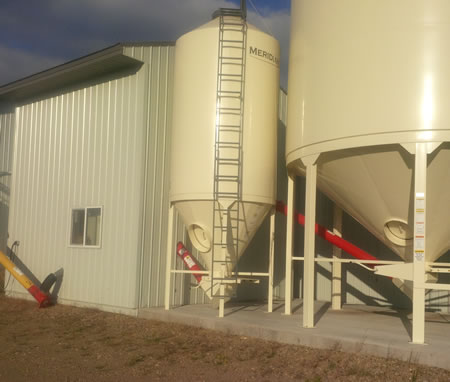Strict biosecurity good for animals and good for business
It can be easy to forget how important biosecurity is until there is a problem, and at that point it is often too late. Farmers who don't take steps now to protect their farms, may find themselves struggling to catch up as biosecurity measures become stricter.
Biosecurity standards are constantly evolving so it is vital that farmers review their operations regularly to determine what can be improved in their biosecurity practices.
Improvements on farm protect feed
Jason Thiessen, owner of Schoen Eggs Producer Ltd., is one producer taking steps to improve the biosecurity on his farm.
"In our type of operation we are producing food products and consumers are trusting that we're doing our part to protect against disease," says Thiessen. "That's very important to us as we want to continue to build trust with the public. We'll follow the best management practices possible to provide them with a good, safe, healthy product to eat."
Thiessen previously kept his chicken feed in bins, but found that a specially built covered shed was more effective at keeping out rodents and making sure the feed was clean.
"Obviously, when you're storing feed, rodents and other birds are interested in getting at it," says Thiessen. "I feel very confident we now have our feed situation controlled and it will consistently be clean and healthy to feed to our chickens."
The 18'x18' covered wooden structure has steel paneling inside and out to doubly prevent pests from entering.

The new feed shed at Schoen Eggs Producer Ltd.
Thiessen received funding from Growing Assurance – Food Safety On-Farm to help him add biosecurity measures to his farm.
"The funding was helpful, and so were the relationships I made through the application process," says Thiessen. "Some of the suggestions I received from Manitoba Agriculture staff about the best way to construct the feed shed helped me improve the structure so I know it's doing what it is designed to do."
Thiessen believes biosecurity requirements for producers will only grow stricter in the coming years.
"It's very important that we as producers are doing all we can to keep food safe for consumers," he says. "Also, one of our top priorities is to keep our animals healthy and strict biosecurity measures help us do that as well."
Controlling who has access to the farm and restricting certain areas to visitors will go a long way to protecting the health of animals. Also, introducing new animals is a big risk. It is a good idea to test animals before they are introduced to a barn and trace where they have been. Controlling pests, including keeping vermin out of feed, can make a big difference. Properly disposing of carcasses and controlling manure management are also two other preventative measures farmers can take to control disease.
Disease prevention a top priority on farms
The Provincial Poultry Specialist explained that strict biosecurity measures should be top of mind for all producers, whether they raise poultry, beef, swine, sheep or other animals.
"Biosecurity will only become more of a concern in the future," she says. "From the poultry side, we are always implementing biosecurity practices to keep disease off farms. The best way to keep flocks healthy, is to understand the biggest risks that lead to disease, and to take steps to reduce those risks."
Proper biosecurity measures keep animals healthy which improves profits for farmers, opens up wider markets and helps them grow their operations.
Premises Identification Number
An important step to establishing proper biosecurity in Manitoba is a solid traceability system. Premises identification is an essential part of that system and can be completed at no cost to the participant.
Manitoba's Premises Identification System maps out parcels of land where livestock and poultry are grown, kept, assembled or disposed of. All owners and operators of premises with livestock and poultry must supply basic land information by completing an application. This information is then entered into a confidential database and a unique national Premises Identification Number is assigned to the contact. In a crisis, such as a disease outbreak or natural emergency, officials can use the Premises Identification database to quickly identify individuals who may be affected.
There are many benefits to owners and operators who sign up for the program. Gaining an identification number allows for quick notification of stakeholders if a disease does occur, reduces the impact of an emergency, and allows greater market access and more.
For more information or to get a Premises Identification Number, visit the program page.
Contact
